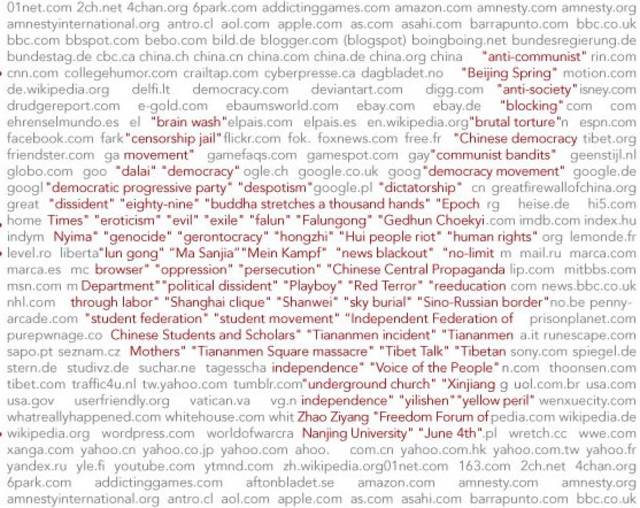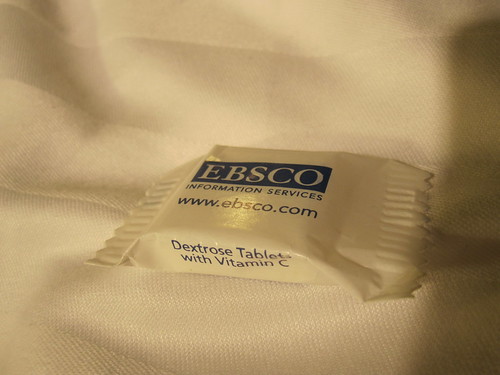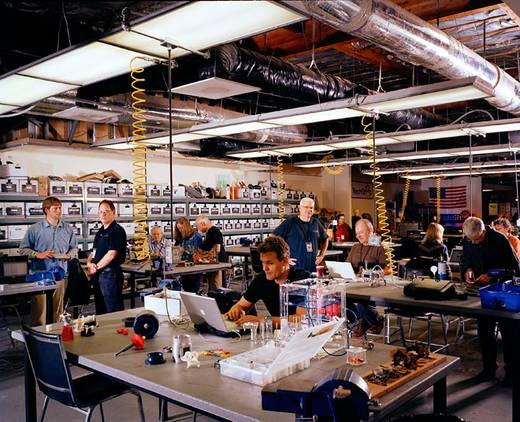The Latest from Boing Boing |  |
- SoCal school district bans the dictionary
- Video: one possible scenario for the future of dating
- Human-powered ferris wheel in Nepal
- Public Domain Manifesto
- No D&D for US prison inmate serving life
- Thinking about time makes you sway
- US gov't data-laundering: using corporate databases to get around privacy law
- Giant working Blythe doll heads
- Giant spider plush toy
- Chris Anderson: "In the Next Industrial Revolution, Atoms Are the New Bits,"
- Corporate developers abandon "underwater" property -- why not individuals?
- Keep Calm and Carry Yarn
- Intro to TOR: how you can be an anti-censorship activist in your sleep
- Word-map of net-censorship in China
- Librarians for Fair Access resists exclusive content contracts
- AppleWatch: Great Touchspectations Shirt
- Computers Should Be More Like Toasters: Farhad Manjoo on All Apple's Eve
- BBC pimps chimps' glimpse
- HOWTO: Thrive as a Musician Without Suing Your Fans
- iPhoning his way to retirement $0.70 at a time
- Leica to release limited edition camera for People's Republic of China 60th anniversary
- This Week in Space, with Miles O'Brien
- The unbearable awfulness of pine mouth
- The S From Hell: a documentary by Rodney Ascher
- Helveticookies
- Begian Senator proposes Hadopi-like law
- Gnop: Avoid Hitting Paddle For High Score
- If Steve Jobs gave the State of the Union address
- ASCII heart necklace
- Incredible miniature photography
| SoCal school district bans the dictionary Posted: 26 Jan 2010 05:06 AM PST Southern California's Menifee Union school district has banned the Merriam Webster's 10th edition from use in fourth and fifth grade classes, over this salacious definition of "oral sex": "oral stimulation of the genitals". 'Oral sex' definition prompts dictionary ban in US schools (via JWZ) Previously:
|
| Video: one possible scenario for the future of dating Posted: 26 Jan 2010 05:04 AM PST In this kooky video, Finnish interaction designer Mikko Pitkänen imagines a future in which augmented reality helps us find romantic partners through a cone-shaped device called the Love-O-Scope. Perfect for those of us who hate dating... I think. The Love-O-Scope (via NotCot) |
| Human-powered ferris wheel in Nepal Posted: 26 Jan 2010 04:38 AM PST At the Hindu Swasthani Mela festival held in Kathmandu earlier this month, I spotted a small ferris wheel that appeared to be non-functional. It consisted of four octagonal open-air cages and a simple metal frame. When two kids climbed into one of the octagons, though, a man got up on the other side and started jumping up and down, eventually getting the thing to turn like any other ferris wheel. Apparently this is pretty common in parts of Asia where electricity is not always readily available — like this much bigger two man-powered version filmed in India. The merry-go-round you see in the right corner of the above video, by the way, was powered by a used car battery. |
| Posted: 26 Jan 2010 01:23 AM PST Paul sez, Over the last few months a couple of academics and free culture activists working together in the Communia network have drafted a manifesto about the public domain in the digital age.The Public Domain Manifesto (Thanks, Paul!) Previously:
|
| No D&D for US prison inmate serving life Posted: 25 Jan 2010 10:25 PM PST Noting that "punishment is a fundamental aspect of imprisonment, and prisons may choose to punish inmates by preventing them from participating in some of their favorite recreations," a 7th U.S. Circuit Court of Appeals upheld a ban the playing of Dungeons and Dragons by a US prison inmate serving life for first-degree murder: Game over: Wisconsin inmate can't play Dungeons & Dragons (Thanks, Factotum!) (Image: Wulfgar on his warhorse, a Creative Commons Attribution photo from Benimoto's photostream) Previously:
|
| Thinking about time makes you sway Posted: 25 Jan 2010 10:18 PM PST People who are thinking about the past sway backward, people who are thinking of the future sway forward Moving Through Time: Thinking of the Past or Future Causes Us to Sway Backward or Forward (Image: Leaning, a Creative Commons Attribution photo from vonSchnauzer's photostream) Previously:
|
| US gov't data-laundering: using corporate databases to get around privacy law Posted: 25 Jan 2010 10:11 PM PST "Buying You: The Government's Use of Fourth-Parties to Launder Data about 'The People'," a paper by Columbia Law School's Joshua L. Simmons in the Columbia Business Law Review, describes the way that US government agencies circumvent the fourth amendment and privacy statutes by outsourcing their surveillance to private credit reporting bureaux and other mega-databases. He argues that the law should ban the use of this improperly gathered information, binding paid government informants to the same rules that the government must follow. Buying You: The Government's Use of Fourth-Parties to Launder Data about 'The People' (via Resource Shelf) Previously:
|
| Giant working Blythe doll heads Posted: 25 Jan 2010 10:03 PM PST  Crafter user gorgaus produced these giant, operations (i.e. blinking) Bylthe doll heads (a hairdresser made the six-foot wigs) and put on a catwalk show with them. They're made from fiberglass: "They are quite light, they have a stem at the back of the neck that leads down to the waist where there is a back brace so all the weight is on their hips. The wigs are heavier than the heads, especially the geisha style one. They used dancers instead of models cause they thought they might have more strength and balance." ENORMOUS DOLL HEADS that you can WEAR! With fluttery eyelids!! Cool! (via JWZ) Previously: |
| Posted: 25 Jan 2010 09:57 PM PST  Etsy's Undead Ed continues to produce nightmarishly wonderful plush toys, like this "from scratch" hairy spider. Kellandra The Spider Gremlin Ooak Plush (via Super Punch) Previously: |
| Chris Anderson: "In the Next Industrial Revolution, Atoms Are the New Bits," Posted: 25 Jan 2010 09:54 PM PST In a long, thoughful and exciting piece entitled "In the Next Industrial Revolution, Atoms Are the New Bits," Wired's editor-in-chief Chris Anderson describes the way that networks, 3D printers, and other technologies are reinventing business, from garage hackers to Chinese knock-off factories. Chris's most provocative thesis, a recapitulation of Bill Joy's argument: "working within a company often imposes higher transaction costs than running a project online. Why turn to the person who happens to be in the next cubicle when it's just as easy to turn to an online community member from a global marketplace of talent?" It's fascinating to see this essentially anti-corporate position emerge from a former Economist editor who now runs a major Conde-Nast publication. It's one of the things I like best about Chris's work: he's multidimensional and willing to challenge all sorts of received wisdom. One place he doesn't go here is what corporate giants will do in the face of this sort of "creative destruction" -- are they going to roll over and play dead, or will they fight back with the indiscriminate savagery of a cornered record executive? In the Next Industrial Revolution, Atoms Are the New Bits (Photo: Leon Chew, Wired) Previously: |
| Corporate developers abandon "underwater" property -- why not individuals? Posted: 25 Jan 2010 09:45 PM PST Tishman Speyer Properties and its co-investors just walked away from the largest real-estate deal in US history, simply defaulting on the properties and the loans that bought them and leaving their creditors in the lurch. The properties, Manhattan's 56-building, 11,232-unit Peter Cooper Village and Stuyvesant Town, were "under water" (worth less than the debt hanging over them), so the corporate developers elected to simply jettison them. They're not alone -- Morgan Stanley recently dumped five San Francisco office buildings, stiffing their creditors when the buildings went underwater. As a business-strategy it makes sense: why repay loans secured by assets that are worth less than the loans? Just turn the assets over and cut your losses. But individuals are shamed, bullied, and counselled not to do this when it's their private homes that fall underwater. Everyone from former US Treasury Secretary Hank Paulson to credit counsellors to the Mortgage Bankers Association tell you that defaulting on underwater property is low and dishonest (unless you're a Wall Street player -- then it's just "protecting shareholder value"). Don't Look Back: Major Players Continue To 'Walk Away' From Poor Mortgages (Thanks, Fipi Lele!) (Image: Friendly's Underwater Restaurant, a Creative Commons Attribution ShareAlike image from nlnnet's photostream) Previously:
|
| Posted: 25 Jan 2010 09:35 PM PST  A fine newcomer to the field of remixes of the WWII British "KEEP CALM AND CARRY ON" posters, from Etsy seller jenniegee. A fine newcomer to the field of remixes of the WWII British "KEEP CALM AND CARRY ON" posters, from Etsy seller jenniegee. Keep Calm and Carry Yarn poster Previously: |
| Intro to TOR: how you can be an anti-censorship activist in your sleep Posted: 25 Jan 2010 09:31 PM PST Here's a nice little introductory article on TOR, The Onion Router, a privacy-enhancing technology that helps you to circumvent national, corporate and school firewalls and enhance your anonymity. Originally developed by the US military to help communications get in and out of countries that heavily filter their networks, TOR is free/open software and is maintained by many volunteers around the world, including the Electronic Frontier Foundation. TOR works by passing your traffic through several (theoretically) unrelated computers all over the Internet, using cryptography to keep the origin, destination, and intermediary steps secret from each computer it passes through. You can run TOR on your own computers and they'll become part of this array of intermediary hosts all over the net, making your network connection into a tool for privacy and free access to information. Volunteer Your Computer for Global Privacy (Thanks, Rhona!) Previously: |
| Word-map of net-censorship in China Posted: 25 Jan 2010 09:23 PM PST  Adapted from the book Information is Beautiful, this infographic showing sites and search terms censored by China's Great Firewall. (Thanks, Marilyn!) |
| Librarians for Fair Access resists exclusive content contracts Posted: 25 Jan 2010 07:21 PM PST  Library database vendor EBSCO now has exclusive deals with content providers -- Time, Inc., and Forbes. Libraries who had been getting access to this same content through other vendors will have to pay up or lose electronic access to popular titles such as Sports Illustrated, Time and People. Gale, a competing vendor, has responded with their Fair Access campaign including the Librarians for Fair Access facebook group. tl;dr version: If your library doesn't have EBSCO and wants to continue to offer electronic access to some magazines, they will have to get EBSCO. Previously, most magazines were aggregated and sold by many companies, more about the specifics here. According to Gale: "If you currently receive Time Inc. or Forbes periodical content electronically from Gale or any provider other than EBSCO, you and your patrons will lose access to that content over [2010]." What changed? EBSCO responds, in Library Journal "In many cases, an exclusive relationship is the only way you can have the content in your databases." They were the top bidder in an RFP put out by Major Magazines who felt that they were losing revenue because too many people read their magazines in the library for free. That said, EBSCO is no stranger to the idea of exclusive contracts. What can librarians and patrons do about this? A list from The Book of Trogool.
|
| AppleWatch: Great Touchspectations Shirt Posted: 25 Jan 2010 06:38 PM PST  Boy, I sure hope we don't get sued for leaking these trade secrets! R. Stevens says, Apple is a very secretive company. But not even Steve Jobs himself is more powerful than a trained psychic with a Mental Amplifier Helmet and a mission. In order to cut through all the hype and rumor, I descended into a sensory deprivation tank filled with Dr. Bronner's Magic Peppermint Pure-Castile Soap and put my mutant brain to work.Free desktop image or $16.99 t-shirts here. (thanks, R. Stevens). |
| Computers Should Be More Like Toasters: Farhad Manjoo on All Apple's Eve Posted: 25 Jan 2010 05:04 PM PST Slate's Farhad Manjoo says his hope for the big Apple announcement this week (which I'll be live-blogging from San Francisco) is "a tablet that's as easy to use as an appliance." |
| Posted: 25 Jan 2010 04:55 PM PST  On Wednesday, January 27, the BBC will air what is described as "the world's first film shot entirely by chimpanzees," as part of a natural history documentary called "Chimpcam." The apes created the movie using a specially designed chimp-proof camera given to them by primatologists. The film-making exercise is part of a scientific study into how chimpanzees perceive the world and each other.Finally, a novel solution to spiraling payroll: chimpanzees! Benefits of using chimps over human video content producers: pay in bananas, labor laws inapplicable, they never tire of the board of governers. Movie made by chimpanzees to be broadcast on television (BBC.) |
| HOWTO: Thrive as a Musician Without Suing Your Fans Posted: 25 Jan 2010 04:05 PM PST Via EFF, Mike Masnick of TechDirt, offering advice to music biz lawyers at Midem: "Stop worrying and learn to embrace the business models that are already helping musicians make plenty of money and use file sharing to their advantage, even in the absence of licensing or copyright enforcement. In simplest terms, the model can be defined as: Connect with Fans (CwF) + Reason to Buy (RtB) = The Business Model." |
| iPhoning his way to retirement $0.70 at a time Posted: 25 Jan 2010 04:05 PM PST Brady Forrest writes: My friend Eugene Lin wanted some iPhone App Store money. So he made one iPhone app that was eventually accepted, then another that was rejected and then he found a hit with the racy Peek-a-boo. Along the way he learned the ins and outs of the App Store approva process and made quite a lot of money in Japan. |
| Leica to release limited edition camera for People's Republic of China 60th anniversary Posted: 25 Jan 2010 03:53 PM PST  Boing Boing reader Linda Constant writes, Boing Boing reader Linda Constant writes, Some pretty surprising and offensive news from Leica, via this post on Leica Rumors: Leica is actually releasing special edition cameras for the 60th anniversary of the People's Republic of China! I've worked a lot in international human rights policy and the role that culture plays in these matters, and I really cannot believe that this edition was okayed by the Leica team!Assuming the rumor's true, perhaps these cameras are equipped with automated lens-smashers or umbrella cops, to foil any photographic documentation that might run afoul of Communist Party censors? |
| This Week in Space, with Miles O'Brien Posted: 25 Jan 2010 03:54 PM PST Miles O'Brien has released a new episode of "This Week in Space", a weekly web video produced with Spaceflight Now. In this edition... A decision nears from President Obama on the future of the manned space program, Elon Musk of SpaceX VEHEMENTLY denies his rockets will be unsafe for astronauts, the clock ticks down to the launch of the shuttle Endeavour, the rover Spirit moves (but just a little), and Miles checks out the lunar inspired artwork of moonwalker Alan Bean |
| The unbearable awfulness of pine mouth Posted: 25 Jan 2010 03:57 PM PST  Serious Eats is curious if you've ever experienced Pine Mouth, a long-lasting metallic taste in your mouth after eating pine nuts. Serious Eats is curious if you've ever experienced Pine Mouth, a long-lasting metallic taste in your mouth after eating pine nuts. Roger Hyam's blog post outlines the issue and links to a medical article which confirms the syndrome but offers no obvious cause. Are Chinese pine nuts to blame? Tips for avoiding Pine Mouth. Reports from Chowhound & Yelp. Official position from the International Nut and Dried Fruit Foundation. [Image: Nuno Tavares via Wikimedia Commons, cc licensed] |
| The S From Hell: a documentary by Rodney Ascher Posted: 25 Jan 2010 03:26 PM PST Remember the Screen Gems stylized "S" logo that appeared at the end of such great TV shows as Bewitched, I Dream of Jeannie, The Monkees, and Partridge Family? My old friend Rodney Ascher was so traumatized by that graphic that he made a documentary/horror film about it, based on interviews with other "survivors" of The S From Hell. Previously: |
| Posted: 25 Jan 2010 05:58 PM PST  (via Jason Fields, photographed by Drew) |
| Begian Senator proposes Hadopi-like law Posted: 25 Jan 2010 01:05 PM PST From @pendrift: Belgian Senator Monfils plans to submit proposals for a three-strikes copyright law. [English translation] |
| Gnop: Avoid Hitting Paddle For High Score Posted: 25 Jan 2010 06:26 PM PST  Gnop might be the most austere game you play all week, though not necessarily the simplest: Bit Battalion have (as you'll follow from the title) turned Pong on its head by giving you control of the ball, rather than the paddle, and wrapped it in light poetic metaphor. The most surprising thing about it, though? That it took 38 years for someone to pull off such an obvious role reversal. Gnop [Bit Battalion] Gnop might be the most austere game you play all week, though not necessarily the simplest: Bit Battalion have (as you'll follow from the title) turned Pong on its head by giving you control of the ball, rather than the paddle, and wrapped it in light poetic metaphor. The most surprising thing about it, though? That it took 38 years for someone to pull off such an obvious role reversal. Gnop [Bit Battalion] |
| If Steve Jobs gave the State of the Union address Posted: 25 Jan 2010 12:15 PM PST Christopher Beam and Josh Levin of Slate imagine Steve Jobs giving the State of the Union address:
|
| Posted: 25 Jan 2010 11:42 AM PST  Becky Stern sez, "Many of you requested I make available a version of my <3 necklace, so here it is!" New <3 Necklace, for sale this time (Thanks, Becky!) Previously: |
| Incredible miniature photography Posted: 25 Jan 2010 11:03 AM PST   Sean Michael Ragan of Makezine writes: "Matthew Albanese [is] a photographer who builds meticulously detailed landscape models and then lights and shoots them to achieve amazing realism. My personal favorite is the Martian landscape made from paprika and charcoal." Also show here: Tornado made of steel wool, cotton, ground parsley and moss. |
| You are subscribed to email updates from Boing Boing To stop receiving these emails, you may unsubscribe now. | Email delivery powered by Google |
| Google Inc., 20 West Kinzie, Chicago IL USA 60610 | |

 "It's hard to sit and read the dictionary, but we'll be looking to find other things of a graphic nature," district spokeswoman Betti Cadmus told the paper.
"It's hard to sit and read the dictionary, but we'll be looking to find other things of a graphic nature," district spokeswoman Betti Cadmus told the paper.  Singer, 33, has been a devoted player of the fantasy role-playing game since he was a child, according to the court ruling. After the ban went into effect, prison officials confiscated dozens of Dungeons & Dragons books and magazines in his cell as well as a 96-page manuscript he had written detailing a potential scenario for the game that players could act out.
Singer, 33, has been a devoted player of the fantasy role-playing game since he was a child, according to the court ruling. After the ban went into effect, prison officials confiscated dozens of Dungeons & Dragons books and magazines in his cell as well as a 96-page manuscript he had written detailing a potential scenario for the game that players could act out.  University of Aberdeen psychological scientists Lynden Miles, Louise Nind and Neil Macrae conducted a study to measure this in the lab. They fitted participants with a motion sensor while they imagined either future or past events. The researchers found that thinking about past or future events can literally move us: Engaging in mental time travel (a.k.a. chronesthesia) resulted in physical movements corresponding to the metaphorical direction of time. Those who thought of the past swayed backward while those who thought of the future moved forward.
University of Aberdeen psychological scientists Lynden Miles, Louise Nind and Neil Macrae conducted a study to measure this in the lab. They fitted participants with a motion sensor while they imagined either future or past events. The researchers found that thinking about past or future events can literally move us: Engaging in mental time travel (a.k.a. chronesthesia) resulted in physical movements corresponding to the metaphorical direction of time. Those who thought of the past swayed backward while those who thought of the future moved forward. 

 Former Treasury Secretary Hank Paulson once said: "And let me emphasize, any homeowner who can afford his mortgage payment but chooses to walk away from an underwater property is simply a speculator - and one who is not honoring his obligations."
Former Treasury Secretary Hank Paulson once said: "And let me emphasize, any homeowner who can afford his mortgage payment but chooses to walk away from an underwater property is simply a speculator - and one who is not honoring his obligations."  Bill McGonigle, of Lebanon, New Hampshire, decided to become a Tor volunteer when he learned that people in Iran were protesting the results of their June Presidential election. They were using the Internet to organize their meetings. The Iranian government was trying to censor their messages to one another. "I have a soft-spot for people trying to gain liberty for themselves," he wrote in an email, "especially against tyrannical regimes. It became known that they were using Tor to get around the censorship, so at that point I put up a relay....The people I'd like to help are those living under violence-based oppression, most commonly orchestrated by dangerous and corrupt individuals posing as legitimate governments. I'd like to see an end to oppression wherever it exists."
Bill McGonigle, of Lebanon, New Hampshire, decided to become a Tor volunteer when he learned that people in Iran were protesting the results of their June Presidential election. They were using the Internet to organize their meetings. The Iranian government was trying to censor their messages to one another. "I have a soft-spot for people trying to gain liberty for themselves," he wrote in an email, "especially against tyrannical regimes. It became known that they were using Tor to get around the censorship, so at that point I put up a relay....The people I'd like to help are those living under violence-based oppression, most commonly orchestrated by dangerous and corrupt individuals posing as legitimate governments. I'd like to see an end to oppression wherever it exists." 
 Thank you for coming. And thank you to President Obama for asking me to deliver this year's speech. We're going to make some history today.
Thank you for coming. And thank you to President Obama for asking me to deliver this year's speech. We're going to make some history today.
No comments:
Post a Comment